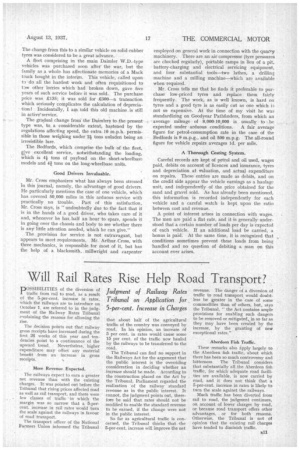Will Rail Rates Rise Help Road Transport?
Page 45

If you've noticed an error in this article please click here to report it so we can fix it.
Judgment of Railway Rates Tribunal on Application for 5-per-cent. increase in Charges
P0551131LITIES of the diversion of traffic from rail to road, as a result of the 5-per-cent. increase in rates, which the railways are to introduce on October 1, are referred to in the judgment of the Railway Rates Tribunal explaining the reasons for allowing the rise.
The decision points out that railway gross receipts have increased during the first 20 weeks of this year and tendencies point to a continuance of the upward trend. Nevertheless, higher expenditure may offset any material benefit from an increase in gross receipts.
More Revenue expected.
The railways expect to earn a greater net revenue than with the existing charges. It was pointed out before the Tribunal that rising prices affected road as well as rail transport, and there were few classes of traffic • in which the margin was so narrow that a 5-percent. increase in rail rates would turn the scale against the railways in favour of road transport.
The transport officer of the National Farmers Union informed the Tribunal that about half of the agricultural traffic of the country was conveyed by road. In his opinion, an increase of 5 per cent, in rates would cause some 15 per cent. of the traffic now hauled by the railways to be transferred to the road.
The Tribunal can find no support in the Railways Act for the argument that the public interest is the overriding consideration in deciding whether an increase should be made. According to the construction placed on the Act by the Tribunal, Parliament regarded the realization of the railway standard revenue as in the public interest. It cannot, the judgment points out, therefore be said that rates should not be modified to enable the standard revenue to be earned, if the change were not in the public interest.
So far as agricultural traffic is concerned, the Tribunal thinks that.the 5-per-cent. increase will improve the net revenue. The danger of a diversion of traffic to road transport would doubtless be greater in the case of some commodities than of others, but, says the Tribunal. "the Act contains ample provisions for enabling such dangers to be removed or mitigated,in so far as they may have been created by the increase, by the granting of new exceptional rates."
Aberdeen Fish Traffic.
These remarks also apply largely to the Aberdeen fish traffic, about which there has been so much controversy and bitterness. The Tribunal considers that substantially all the Aberdeen fish traffic, for which adequate road facilities are available, is now carried by road, and it does not think that a 5-per-cent. increase in rates is likely to turn the scale against the railways.
Much traffic has been diverted from rail to road, the judgment continues, on account of lower charges by road, or because road transport offers other advantages, or for both reasons. Otherwise, the Tribunal is not of opinion that the existing rail charges have tended to diminish traffic.




















































































